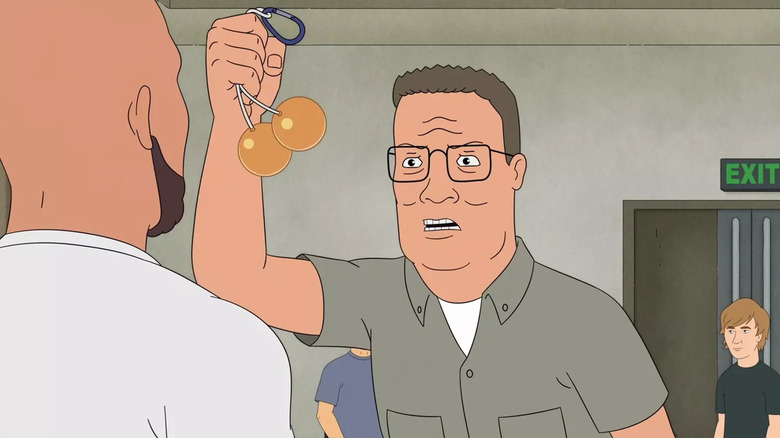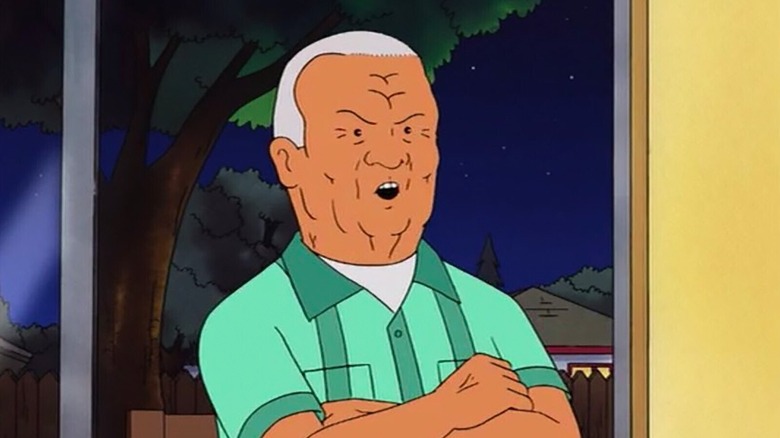The King Of The Hill Revival's Best Episode Takes Down 2025's Most Loathsome Target
This article contains spoilers for "King of the Hill" season 14, episode 9, "No Hank Left Behind."
In the world of "King of the Hill," one of the most interesting relationship dynamics is between patriarch Hank Hill (Mike Judge) and his significantly younger half-brother, Good Hank, also known as G.H. Sibling age gaps are common, but a 40-year gap is less so. It's one of the most interesting aspects of the latter seasons of the show's original run, because it also meant Hank's son Bobby was more than 10 years older than his uncle G.H. With the "King of the Hill" revival series jumping ahead over a decade, this puts Hank and G.H. in a dynamic that, age-wise, resembles something more like a father and son, much to the retired Hank's dismay.
Now a true-blue member of Gen Alpha, G.H. is glued to his phone and can't be bothered to pay his mother Didi (Ashley Gardner) any attention beyond scoffs, sighs, and rolled eyes. Recognizing that her son requires a kind of help that she cannot provide, she begs Hank to take his little brother under his wing and help him as he approaches puberty. Hank, however, struggles to bond with G.H., who is a little too invested in the world he's escaping to online. As it turns out, G.H. wants to attend the Man Made Boot Campinar, a "personal development opportunity" event hosted by G.H.'s favorite online content creator, who promises to improve the "four F-bombs: family, faith, finances, and fitness."
Hank is thrilled that G.H. wants to dedicate time to "good old-fashioned character building" and is willing to be his adult "mantor" for the two-day event. Of course, because Hank is not chronically online like the rest of us, he doesn't realize that G.H. has just signed them both up for a boot camp hosted by Eli, a manosphere grifter in the style of Andrew Tate.
King of the Hill provides perfect insight into how boys get sucked into the manosphere
When G.H. first shows his big brother the promotional ad for the Man Made Boot Camp, Hank is completely unaware of the threat these sorts of people pose to young men. The fact that he doesn't see the very obvious red flags that anyone who has spent even a microsecond investigating manosphere content could spot from a mile away showcases exactly how young men fall into the pipeline. When the Hill brothers arrive and Hank hears, "Over the next two days, you can expect to build up your entrepreneurship, self-confidence, leadership skills, and brotherhood," he's drawn in like a moth to a flame. But as soon as the presentation begins, the insidious underbelly of Man Made starts to show its face, and Hank sees it for what it is.
He presses back when Eli suggests that working under another man is "beta behavior," citing his many successful years employed by Buck Strickland, and has zero patience for how quickly the folks behind Man Made — and the other attendees — find a way to blame females for all of the problems in their lives. G.H. laments being "friend-zoned" by a girl he likes, and while the rest of the boot camp validates his anger, blaming the girl for his heartbreak, Hank tells him directly that if a girl just wants to be friends with him, that's her choice, and he needs to respect it. Hank's commitment to standing up for women turns him into a pariah within the group, even though he's the only one there who actually has a wife or girlfriend.
Instead of listening, G.H. lashes out, telling Hank he's "a weak sissy with a fat neck, a stupid soy-boy," It's an expression reminiscent of their father Cotton that scares him into a full-on "BWAAAAAH!"
Helping G.H. helps Hank heal his wounds from Cotton
"King of the Hill" has showcased some pretty reprehensible people throughout its run, but you'd be hard-pressed to find a character that did more damage to the Hill family than Hank's father, Colonel Cotton Hill. A WWII veteran whose pride is his claim that he killed "fiddy men," he lost his shins in the war and had his feet attached to his knees. A traditionalist to his core, Hank spent his entire life desperate for the approval of his father, even though Cotton is the poster child for why so many adults go no-contact with their parents.
Cotton was a racist, misogynist, bigoted, cruel old coot who knew how much Hank was hurt by his mistreatment of him and not only didn't care but took pleasure in making his "sissy" son suffer. Hell, it got so bad in season 6 that it took former president Jimmy Carter to put them on the path to a civil reconciliation. Seeing Cotton's hatred flowing through G.H. is enough for him to enlist Dale Gribble's help in learning the truth about Eli Selwick, a scammy loser who has been spewing vile lies that are only possible because his mother invested in his business without fully understanding what he was up to.
"No Hank Left Behind" displays how Hank's understanding of his father has changed in the years since his passing. He now has enough distance to be able to recognize, in hearing G.H. parrot hateful rhetoric, that many of his own beliefs are regressive ideas about the world that he inherited from his father. When "King of the Hill" went off the air, discussions about toxic masculinity and how men get radicalized weren't nearly as commonplace as they are now, which makes this episode the best in the revival season from a character standpoint. Hank's continued development, his relationship with his younger brother, and his feelings about his father are all explored in a way that they could not have been from 1997-2010.
That boy ain't right just yet, but by imparting respectful wisdom about what it means to "be a man" and teaching him that women are deserving of respect, Hank can give G.H. what their father was never willing or able to provide either of them: a positive male role model.
The "King of the Hill" revival is now streaming on Hulu.


